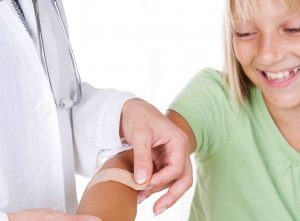
It’s September, and kids everywhere are going back to school. And school nurses everywhere are there to serve them when they’re hurt, or sick, or in need of other medical attention.
In this article on Brookline, Massachusetts’ Wicked Local website, a RN and school nurse named Patricia Laham seeks to answer the question, “What does a school nurse really do, anyway?”
She says that she’s dealt with many erroneous assumptions in 12 years on the job, like, “Oh that must be fun, taking care of boo-boos all day.” In the face of these kinds of deprecating comments Laham used to feel compelled to cite her employment at a prestigious local hospital to prove that she was a “real” nurse. However, now she is more likely to say how much she loves it, how challenging she finds it, and also how isolated it can be, especially in emergency situations. A school nurse usually has only her own judgment to go on when making an assessment — there isn’t a team of experts ready to jump in and contribute.
And school nurse visits are up, possibly in part because more people are relying on (free) school nurses when they have inadequate insurance due to layoffs or increased premiums. So school nurses are “real” nurses in that sense as well.
Laham starts to explain the duties of a school nurse with the more prosaic paperwork sorts of responsibilities; checking immunization records, reviewing medical records, meeting with families if a child has a medical condition, obtaining medication orders, creating individual health plans, etc.
Virtually every visit from a student involves an element of health education, as do many conversations with parents: from lice to head bumps, signs of strep, when to consult a physician, and when to keep a child home. [The school nurse] also educates staff about basic first aid for choking, when not to move an injured student, standard precautions, or about using the Epi-Pen.
The daily student visits require assessment and care. [The school nurse] takes care of all of the students at your school. She calls parents when they are sick and need to go home, but she does her best to treat them at school: comfort, console, counsel, feed, listen to, advocate for, or whatever else it takes to help them so that they can return to class and be available to learn.
She performs the state-mandated screenings — vision, hearing, height and weight, scoliosis — and refers students on to their health care provider when necessary.
She maintains up-to-date and accurate medical files.She is involved in preparation for field trips. This includes gathering medications that may be necessary to have on the trip for particular students.
The school nurse is an integral part of the disaster planning team at school, collaborating in the planning and practicing lockdowns, evacuations and medical drills.She maintains public health through immunization compliance and doing surveillance as necessary during illness outbreaks — keeping school, families and public health departments aware of issues of concern.
The school nurse is involved in mental health aspects of the student’s lives, often working with the parents, the psychologist or guidance counselors regarding concerns such as anxiety, depression, school stress or bullying.
The school nurse does all of this with a commitment to confidentiality. She works with parents to determine who needs to know certain information and shares information with those who “need to know” and reminds staff about confidentiality.There are many layers to school nursing. It is a job that is often unpredictable, which makes planning and preparation so important. The bottom line is the health, safety and wellbeing of every child. Keeping students safe and healthy so that they are available to learn is the goal of every school nurse. The rewards are as numerous as the students themselves.
